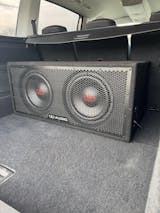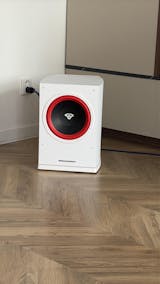The power of bass: A deep bass with bass reflex subwoofer systems

How bass reflex subwoofer systems work
Bass reflex subwoofer systems are one of the most popular subwoofer types, often chosen for those looking for high bass performance. These speakers feature bass reflex technology that optimizes bass response and improves subwoofer depth. Compared to closed subwoofers, bass reflex subwoofer systems have several advantages. They can produce a higher volume without sacrificing sound quality, and they are space-saving and lighter than other large subwoofer types, such as PA systems.
Bass reflex technology works by directing the acoustic waves at the rear of the subwoofer to a specific area in the enclosure. The bass reflex system consists of a tube, usually located at the rear of the subwoofer, and one or more valves that control the volume of air inside the enclosure. While the bass is emitted at the front of the subwoofer, the valve at the rear emits the sound into the bass reflex tube and directs it back into the enclosure. This raises the sound below the resonance frequency of the subwoofer by an additional 3-6 decibels, thus optimizing the bass response and bass performance.
What should you look out for when buying a bass reflex subwoofer?
When buying a bass reflex subwoofer, interested parties should pay attention to the quality of the materials and workmanship in order to experience the power of the bass in home cinema sound to the full. It is important to make sure that the cabinet is strong and stable and ideally made of high-quality wood. You should also choose a subwoofer that is suitable in size and performance for the size and design of the room. It is advisable to choose a compact subwoofer for smaller rooms, while a more powerful model is advantageous for larger rooms.
The advantages of bass reflex subwoofer systems
Compared to closed subwoofers, bass reflex subwoofer systems have several advantages. They can produce a higher volume without sacrificing sound quality, and they are space-saving and lighter than other large subwoofer types, such as PA systems.
How does the bass reflex system work?
Bass reflex technology works by directing the acoustic waves at the rear of the subwoofer to a specific area in the enclosure. The bass reflex system consists of a tube, usually located at the rear of the subwoofer, and one or more valves that control the volume of air inside the enclosure. While the bass is emitted at the front of the subwoofer, the valve at the rear emits the sound into the bass reflex tube and directs it back into the enclosure. This raises the sound below the resonance frequency of the subwoofer by an additional 3-6 decibels, thus optimizing the bass response and bass performance.
Choosing the right bass reflex subwoofer systems
Bass reflex subwoofer systems are very popular for their high low bass performance and offer immense bass power.
However, there are various types of subwoofers that differ in terms of size, power and design. When purchasing a bass reflex subwoofer, you must therefore first be clear about the intended use of the subwoofer.
Another important aspect of bass reflex technology is the quality of materials and workmanship. When buying a subwoofer, you should also obtain information about the home cinema sound application and PA systems in order to achieve the desired sound.
A key factor in the purchasing decision process is also the budget and how much you can invest to achieve an optimal sound experience.
To avoid being disappointed later, you should therefore do extensive research in advance and read through comparative tests of bass reflex subwoofer systems. Making the right choice in advance will prevent disappointment later on.
Optimize the bass response: Tips and tricks
Finding the right place
The location of the bass reflex subwoofer system plays an important role. Ideally, the subwoofer should be positioned at ear level and in the same plane as the main speakers. Placing it in a corner can enhance the bass response, but can also cause unwanted resonances. Experiment with different positions to achieve the best sound.
Consider room acoustics
Room acoustics have a major influence on bass reproduction. Large, empty rooms can lead to weak bass, while a room with lots of furniture and carpets can boost the bass. If the room is acoustically unfavorable, acoustic elements such as curtains, carpets and bass traps can be used to optimize bass reproduction.
Adjusting the subwoofer bass
Modern bass reflex subwoofer systems often offer the option of adjusting the subwoofer 's bass response. This can be done via an integrated equalizer system or via the settings of the home cinema or PA system. The bass response should be adapted to the size and acoustics of the room in order to achieve the best sound.
Use of bass shakers
Bass shakers are special devices that are placed under the seat or sofa and make the bass perceptible through vibrations. They can be an excellent addition to bass reflex subwoofer systems and improve the sound experience.
Using the right cables
The cable connection between the subwoofer and the amplifier can also influence the bass reproduction. Use high-quality cables to ensure optimum signal transmission and minimize interference.
Overall, there are many factors that influence bass reproduction. However, with the right tips and tricks, you can get the most out of your bass reflex subwoofer system and achieve an incredible sound experience.
Connecting and adjusting the bass reflex subwoofer system
Selecting the amplifier
Choosing the right amplifier is crucial for the low bass performance of a bass reflex subwoofer system. The power of the amplifier should be matched to the performance of the subwoofer. An amplifier with low power will not drive the subwoofer sufficiently, while an amplifier that is too powerful could overload the subwoofer.
Integration of the amplifier
The integration of the amplifier into the car hi-fi system should be carried out carefully in order to avoid interference.
Tuning the crossover and gain control
The tuning of the crossover and the gain control is also an important factor for optimum integration of the subwoofer into the overall system. It is important to ensure that the subwoofer transition area to the other speakers is seamless.
Optimization of bass reproduction
To further optimize the bass reproduction, a calibration system or DSP can be used to optimize the subwoofer's bass response. This is particularly recommended for home cinema sound or PA systems, as more precise bass reproduction is required here. Careful adjustment of the subwoofer system is therefore essential for optimum bass response and powerful bass performance.
Conclusion:
In this article, we have discussed the power of bass and the importance of bass reflex subwoofer systems for an optimal sound experience. We explained how these systems work and showed that bass reflex subwoofer systems can reduce distortion and provide a clearer, more structured sound image thanks to their bass reflex technology. We have also provided selection tips and buying advice to help you find the right bass reflex subwoofer system for your needs, as well as advice on how to optimize bass reproduction. This includes the correct placement of the subwoofer, consideration of the room acoustics, adjustments to the subwoofer bass response and the use of bass shakers and high-quality cables.
We have also pointed out the importance of the right amplifier and the correct setting and integration of the subwoofer into the overall system. Careful installation and tuning of the crossover and gain control are crucial for a seamless crossover to the other speakers, while for home cinema sound or PA systems, a calibration system or DSP is also recommended to further optimize the subwoofer's low frequency response.
Overall, when choosing the right bass reflex subwoofer system, you should pay attention to the quality of the materials and workmanship and find out about the different subwoofer types in order to take your home theater sound or PA system to a new level. A thorough understanding of how bass reflex subwoofer systems work and following the tips and tricks mentioned can help to achieve maximum low bass performance and significantly improve the sound experience. In summary, bass reflex subwoofer systems offer a first-class solution for impressive low bass performance and are therefore indispensable for any music or movie enjoyment.







